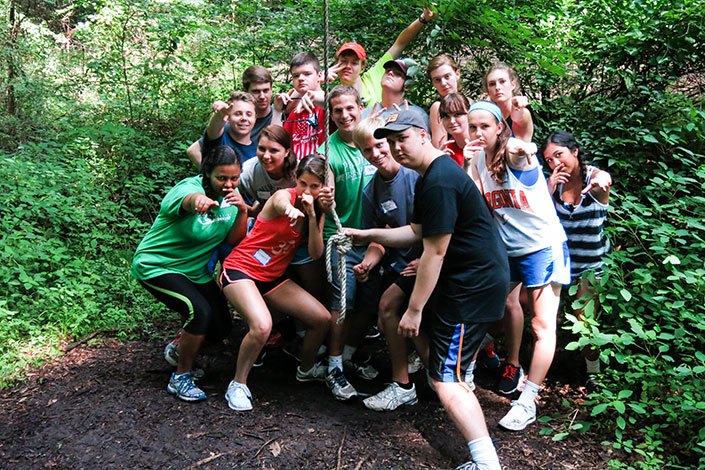Updated, July 22, 11:20 a.m. to note a change of location for the presentations of the High School Leadership Program participants in the last paragraph.
Over the last 11 years, the students of the University of Virginia’s Sorensen Institute for Political Leadership have helped expand educational opportunity, combat domestic violence and even preserve the native honeybee population.
Every summer, Sorensen’s College Leadership Program and High School Leadership Program bring students from all over Virginia to the University to learn about responsible political leadership. At the end of each session, students propose their own legislative solutions to issues facing the commonwealth.
The institute hosted 16 college students in June and on Friday will wrap up its high school program with 29 students.
No matter their age, every student who joins one of the leadership programs has a stake in Virginia’s future. The high school students are all state residents, and each college attendee is either a Virginia resident or currently enrolled in a Virginia school. By giving them the tools for collaboration and a better understanding of how government works, Sorensen is advancing Virginia’s next generation of political and social innovators.
“Sorensen intentionally unites participants who affiliate with different parties to help narrow and bridge the aisle between the two major parties,” program director Cash Arehart said. “We foster bipartisanship among our students in an effort to promote good governance at all levels of government.”
For the younger students especially, Sorensen offers a rare opportunity to experience and understand different viewpoints that they may not have encountered in the smaller high school environment. The high school program’s alumni start college armed with important collaboration tools and are already linked into a statewide network of students.
“What I really loved was developing strong relationships with other politically minded peers, but also peers of different parties,” said Ann Laurence Baumer, a 2009 alumna of the high school program and a May graduate of U.Va.’s Frank Batten School of Leadership and Public Policy. “You come to the table together and learn to respect each other and listen.”
In just over a decade, Sorensen has already produced leaders in government, social justice and international relations. Among their many successful alumni, Sorensen can count people like Beau Wright, the White House’s deputy director of finance, who was a member of the 2006 high school program, and Brian Coy, director of communications for Virginia Gov. Terry McAuliffe, who took part in the 2006 college program.
“I don’t think I’d be where I am right now if I hadn’t gone through Sorensen,” Coy said. “It gave me an understanding of Virginia politics that I wouldn’t have otherwise, and introduced me to a lot of people who have remained close friends or become business associates.”
While many have gone on to influential careers, students have the chance to start affecting change as soon as they arrive at Sorensen. As they learn about the political process, teamwork and effective governing, they also work in small groups to draft their own legislative proposals.
Students are assigned general topic areas for these proposals, but it’s up to them to decide the content and actions they want to address. At the end of the college and high school programs, panels of policymakers judge the proposals. The best ideas are often picked up by the legislature.
“On three occasions, the policy proposals have been carried to the General Assembly and passed into law,” Arehart said. “Many additional projects have either influenced or inspired other laws and bills.”
Sorensen students have inspired laws that require teaching the warning signs of dating violence in schools and promoted greater educational recognition of American Sign Language as a second language.
The most recent student proposal to become law established the Virginia Beehive Grant Fund, which provides a $200 tax credit to beekeepers who purchase a new hive or the materials to construct one. Sorensen students first proposed the measure in 2011 as a way to boost state agriculture and revitalize the dwindling honeybee population. Today it is helping to rebuild Virginia’s bee population, which provides vital pollination for significant crops like apples, grapes and peaches.
In June, Sorensen’s college participants worked together to craft new legislative proposals on regulating medical marijuana, adding business incentives in Southwest Virginia, managing college tuition payments, and setting efficiency standards in Virginia’s ports.
“I feel confident about our medical marijuana proposal, because it’s been proven to help people suffering from multiple sclerosis and HIV/AIDs,” said Michael Lopez, a rising sophomore at the College of William & Mary. “I feel like public opinion is already on our side based on recent polls.”
The high school students will present their proposals this week. Together with sponsor State Farm, the institute tasked them with creating proposals to address the state’s criminal justice system, economic development, election reform, education and infrastructure.
The high school teams will present their proposals Friday at 10 a.m. in the Newcomb Hall Gallery.
Media Contact
Article Information
July 20, 2015
/content/emerging-young-leaders-work-toward-bipartisan-future-uva-institute

